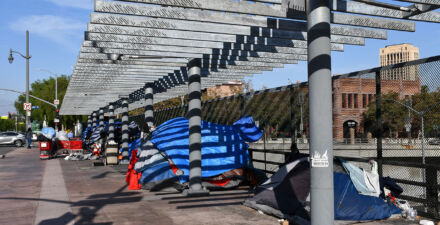Family income for those at the bottom of the U.S. economic distribution have barely budged over the past several decades, while those at the top have skyrocketed. Twelve percent of Americans live in poverty today, including nearly 10 million children. Equitable Growth is growing the evidence base for how rising inequality affects the economic wellbeing of those at the bottom of the economic ladder in order to support the creation of policies that provide both a safety net and a springboard to opportunity for the most disadvantaged among us.
Featured work
The economic impact of housing insecurity in the United States
December 8, 2022
December 8, 2022
In Conversation with Mark Rank
April 14, 2021
April 14, 2021
Income support programs boost earnings for low-wage workers by reducing household poverty in the United States
August 26, 2021
August 26, 2021
Newly released U.S. poverty statistics show that recent economic growth is not broadly shared
September 11, 2019
September 11, 2019
We can cut child poverty in the United States in half in 10 years
March 27, 2019
March 27, 2019
As the U.S. rural economy changes, social safety net programs buoy rural residents above the poverty line
February 1, 2019
February 1, 2019
Explore Content in Poverty164
Request for Proposals: Promoting competition and supporting workers in an era of AI innovation
November 20, 2024
November 20, 2024
Request for proposals: Research grants for early career scholars
October 30, 2024
October 30, 2024
In Conversation with Mishaela Durán
September 12, 2024
September 12, 2024
The Highway to Displacement: Interstate 10 and Black Communities in New Orleans
August 27, 2024
August 27, 2024
Worker Led Lawsuits: The Effects of California’s Private Attorney Generals Act
August 27, 2024
August 27, 2024
Causes and Consequences of Incomplete Unemployment Insurance Take-Up
August 27, 2024
August 27, 2024
The Effects of Participating in Multiple Safety Net Programs on Family Well-Being
August 27, 2024
August 27, 2024
Request for Proposals: How effective was the fiscal response to the COVID-19 recession for workers?
March 18, 2024
March 18, 2024
Request for proposals: Research grants for early career scholars
November 30, 2023
November 30, 2023
The Effect of Means-Tested Transfers on Work: Evidence from Quasi-Randomly Assigned SNAP Caseworkers
November 13, 2023
November 13, 2023
Long Term Own and Dynamic Complementarity Effects of the WIC Program
August 30, 2023
August 30, 2023
Explore the Equitable Growth network of experts around the country and get answers to today's most pressing questions!














